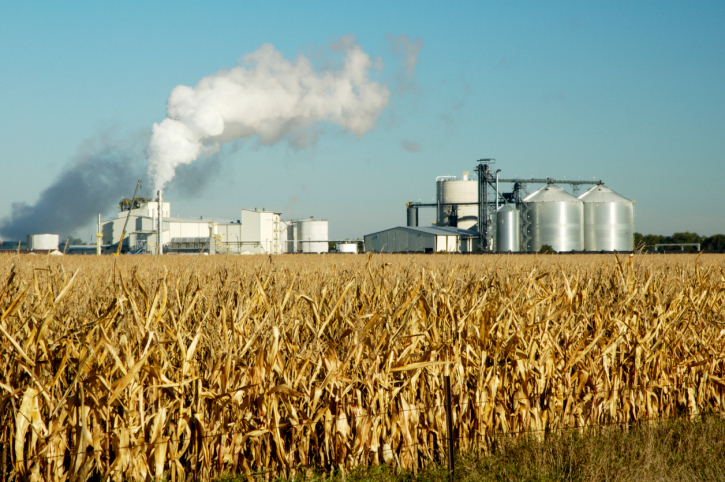The U.S. Environmental Protection Agency announced it is reducing the amount of ethanol that must be blended into gasoline. EPA will require transportation fuel companies to blend 15.21 billion gallons of ethanol into the nation’s fuel supply in 2014, down from 16.55 billion gallons in 2013.
The reduced ethanol blending requirement reflects various concerns regarding fuel supply and the ethanol mandate. Gasoline demand has been lower than recent EPA forecasts, meaning less ethanol is needed to meet desired blending percentages. Also, advances in cellulosic ethanol and other next-generation ethanol sources are not occurring as quickly as EPA anticipated. Finally, a growing amount of data indicates ethanol is not as environmentally friendly as ethanol advocates claimed.
Approaching the Blending Wall
One of the biggest concerns is sluggish gasoline demand would require refiners to blend higher percentages of ethanol into gasoline to meet EPA’s requirements. Auto manufacturers and consumer groups have warned that automobiles, boats, lawnmowers, and other motorized machines suffer damage to key parts when gasoline blends include more than 10 percent ethanol
In December 11 testimony to the U.S. Senate Environment & Public Works Committee, Christopher Gundler, head of EPA’s Transportation and Air Quality Office, said ethanol mandates are pushing gasoline refineries close to the point where adding more ethanol to the fuel mix is counterproductive.
“We’re recognizing that the blend wall has been reached,” Gundler testified.
American Petroleum Institute President Jack Gerard welcomed EPA’s decision, but told reporters in a teleconference EPA should further roll back ethanol mandates.
“For the first time, EPA has acknowledged that the blend wall is a dangerous reality. While the agency took a step in right direction, more must be done to ensure more Americans have a choice of fuels they want,” said Gerard.
AP Documents Environmental Harms
EPA announced its decision just four days after the Associated Press published a lengthy investigative article documenting substantial environmental harms caused by ethanol. The article, “The Secret Environmental Cost of U.S. Ethanol Policy,” concluded, “The ethanol era has proven far more damaging to the environment than politicians promised and much worse than government admits today.”
Ethanol mandates have spurred farmers to grow corn on relatively unproductive land that remained undeveloped prior to the mandate, the Associated Press observed.
“Five million acres of land set aside for conservation—more than Yellowstone, Everglades and Yosemite National Parks combined—have vanished on Obama’s watch. Landowners filled in wetlands. They plowed into pristine prairies, releasing carbon dioxide that had been locked in the soil. Sprayers pumped out billions of pounds of fertilizer, some of which seeped into drinking water, contaminated rivers and worsened the huge dead zone in the Gulf of Mexico where marine life can’t survive,” the Associated Press reported.
Politics Trumping the Environment
The Associated Press noted politics are trumping legitimate environmental concerns.
“The consequences are so severe that environmentalists and many scientists have now rejected corn-based ethanol as bad environmental policy. But the Obama administration stands by it, highlighting its benefits to the farming industry rather than any negative impact,” the Associated Press observed.
Less Intervention, Better Results
Agricultural experts point out American farmers would do just fine without the myriad government regulations, restrictions, and programs that distort agricultural practices.
“America is blessed with the richest farmland in the world, and American farmers are without equal,” said Jay Lehr, science director for the Heartland Institute, which publishes Environment & Climate News. “What American farmers need more than government intervention is government self-restraint.
“In an attempt to score political points with farmers, politicians established ethanol mandates that gave farmers a guaranteed market share in transportation fuels. At the same time, however, EPA and other government agencies impose legally and scientifically unjustified restrictions on agricultural runoff and beneficial practices such as fertilizer use and pesticide use,” Lehr explained.
“Rather than a government agriculture policy based on ‘more of the above’ regulations, restrictions, and programs, farmers and consumers would best benefit from a ‘less of the above’ strategy. Remove the shackles from American farmers, and agricultural producers and customers will equally benefit,” said Lehr.
James M. Taylor ([email protected]) is managing editor of Environment & Climate News.
Internet Info:
“The Secret Environmental Cost of U.S. Ethanol Policy,” Associated Press, Nov. 12, 2013, http://heartland.org/sites/default/files/the_secret_environmental_cost_of_us_ethanol_policy.pdf





